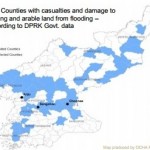According to the Daily NK:
An agreement has been reached that sees the minimum monthly wage for North Korean workers in the Kaesong Industrial Complex rise by 5% to a little over $67.
According to information released by the Ministry of Unification today, the wage increase was negotiated by the Kaesong Industrial Complex Management Committee and the North Korean ‘Central Special Economic Zone Development Bureau’.
In accordance with the agreement, which will remain in force until the end of July next year, the wages of workers will rise from $63.80 to $67.05 per month.
Kaesong Industrial Complex regulations stipulate that wages may not rise by more than 5% per annum, and since 2007 they have risen by exactly that amount year-on-year.
At the end of May this year, there were 123 South Korean companies operating in the zone, employing a total of 51,452 North Korean staff.
According to the Ministry of Unification, when all payments and bonuses are taken into account, the average wage per North Korean worker in the complex was $110 per month in 2011, a figure that has risen to $130 in the first half of this year.
There has long been controversy over the fact that the North Korean authorities take a percentage of the wages of Kaesong Industrial Complex workers in taxes. However, even taking this into account, such workers are known to be better off than the vast majority of average North Koreans.
The only edit I would make to this story is to change the phrase “percentage of the wages of Kaesong Industrial Complex workers in taxes” in the above paragraph to “nearly all of the workers’ monetary income in taxes”.
Read the full story here:
Kaesong Monthly Wages Rise by 5%
Daily NK
Park Seong Guk
2012-8-6

